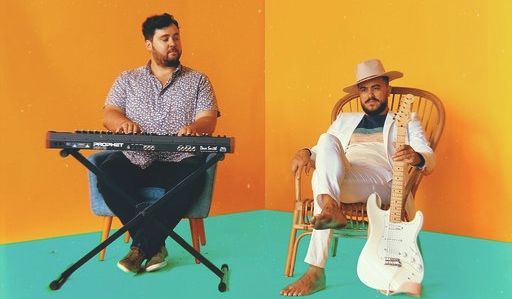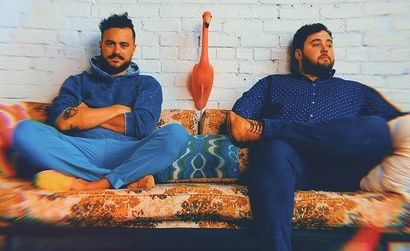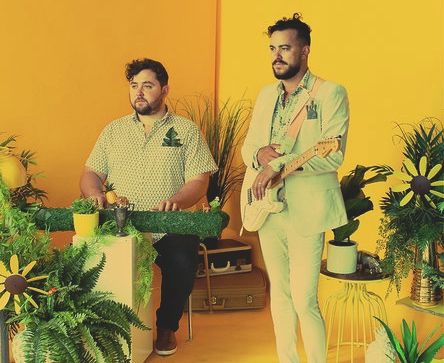Color Fields are Ready to Brighten Up Your Playlists

Much like the spectrum of a rainbow, CT-based indie pop duo Color Fields feature a little bit of everything, and the result is something beautiful.
The twosome of Scott Packham and John Torres (photo: L to R), who have been playing together for years, have a wide-range of influences, including R&B, rock, soul, and EDM, all of which have become part of their sound.
Their debut EP as Color Fields will be on the way later this summer, and features production from musical heavyweights Jerry “Wonda” Duplessis and Peter Katis.
I caught up with both members of Color Fields to find out about their musical histories, as well as how they went about the difficult task of figuring out how to release an EP during such a unique time in America. They also discussed their thoughts on the fate of local music scenes in a COVID aware society, and where live streaming will fit in after all is said and done.
Let’s start by talking about your personal history. When and how did you two meet, and was it music that initially brought you together?
John: It was definitely music.
I was really into indie rock at the time when I was looking to start a new band. This was a long time ago. I was very much a neophyte in recording, and how to actually make music.
I really wanted to start playing with somebody that played keyboards, and I didn’t know anybody that played keyboards. Not a soul. I asked around a ton, and finally … who was it that connected us?
Scott: Dave Porter.
John: Dave Porter! Of course!
My parents own this little cafe in Black Rock called Harborview, and next door is a house that’s part of the property, and they rent it out almost exclusively to musicians. Dave was living there at the time, and I had asked him, “Hey, do you know any keyboard players,” and he connected me with Scott. Scott and I met one time at my parents … this was almost ten years ago.
Scott: It was very close to Christmas 2011, or 2012, and I met you at your apartment. You showed me some of your music. I think we started playing since then.
John: Yeah, we started making some stuff up at that point.
I had a band before this called Oh, Cassius, that was more of an indie folk kind of thing. Scott actually ended up joining that band. When it broke up, Scott and I kept going together.
Scott: It made more sense, stylistically, with the different songwriting direction that we were starting to take, that we would start a different project that would have no association and no similar songs. It was so different.
Did you have that sound in mind originally, or was there some trial and error in terms of what you guys were gonna do together?
Scott: Pretty much right away it was the sound we have now, which is pretty wide-ranging.
Even just working between Peter Katis – indie rock, great producer – and Jerry Wonda, who’s mister R&B hip-hop, there’s no way it wasn’t gonna have a little bit of a different feel to it.

Who, or what, do you credit the most for opening your ears to so many different genres of music?
Scott: My dad is a musician, (so) I grew up with a lot of music in the house.
The basement of our house was all music. There’s an entire wall of just CDs, an entire wall of records, even DAT tapes and cassettes.
Please tell me that basement is protected from flooding.
Both: {laughs}
Scott: It’s so far away from the water that it’s fine, but it’s most definitely not protected.
Dude, come on!
Scott: {laughs} It definitely could be better protected for sure.
John, what started you off on your musical journey, and discovering all these different genres of music?
John: I would actually credit Scott with increasing my interest into other realms.
I was sleeping on so much stuff.
Scott introduced me to (the music of) Prince. This was probably five years ago. We decided to play “Purple Rain,” which was probably the only Prince song that I actually knew, and at the end of where the verses and the choruses end, I just stopped the song, and he angrily was like, “You don’t know the solo?!?!”
Scott: You gotta do the ending!
John: It’s as much of the song as anything, but in reality I just had no idea.
So I’ve actually expanded my musical genre interests so much over the last, say five years.
My interest in music started really late. I was kind of a jock in high school, and my parents, neither of them are musicians. Nobody in my family is a musician. I’m the only one. There was no music in my life until was about 15 or 16 when my sister got piano lessons, and I was kinda like creeping at the edge of the door just like, “What the f … I want to do that!” That was the first pang that I got where I was like, “I think I like music.”
My parents listened to music – Elton John, Cat Stevens, Bob Dylan, Crosby, Stills, Nash & Young – and that’s the stuff that I was like, I really like this.
Of course in high school it was a lot of ‘90s hip-hop, and the grunge era, and Dave Matthews Band, but it was kind of like everybody else was listening to it, so I was listening to it. I didn’t feel passionate about anything.
It wasn’t a concerted effort like, “I am going to listen to this.”
John: Right. (It was) whatever everyone else was listening to.
Scott: Whereas my middle school experience was not being able to relate to anyone because they didn’t also listen to the 2005 era Herbie Hancock albums that were coming out.
I wound up going to music school for jazz piano. I was very into jazz. I listened to jazz, R&B, electronic music, and I didn’t really listen to any music that anybody else listened to at my school at the time, and that was a very different experience.
John: Yeah, but you like New Found Glory, though.
Scott: By the time I got to high school I think there was a phase … right around 14 I was like – all this music that my friends are into, I’m gonna dive head on in.
I definitely went to all of the Radio 104 Fest shows.
John: Oh hell yeah. I was at every Radio 104 Fest. I don’t remember (a single) one of them because … well, you can probably imagine why.
We are in a very unique time in history, dealing with a pandemic, political unrest, and nationwide protests. I’ve seen a lot of artists wrestle with the idea of releasing new music right now. What made you ultimately decide you want to release your EP now, and what do you feel is the role of music right now?
Scott: We started working with Jerry Wonda a year ago putting some of these songs together. We had hoped to have it out sooner, but one thing after another comes up in a process like that, so things got delayed.
Once it started to get to be COVID-19, and the issues surrounding that, we were at the phase where we were transferring files from our mix engineer to mastering, and we weren’t able to do that because the files lived in downtown Manhattan, and they couldn’t get them.
Then we’re trying to shoot a video for “Summertime,” but we have to keep social distancing in mind.
With social unrest we felt like it was important to acknowledge it. We put up a post, and we took all of our advertisements down for a time.
It certainly changes our timeline, and COVID-19 has changed things for us, and the social unrest … it’s great to see a lot of the industry speak out about things.
John: Yeah. I think in determining whether or not we were going to release it, or should we push the release, certainly for COVID-19 I’d say just put it out. People have tons of time right now, so I think putting music out, and posting about it, and promoting it, is a good thing.
As far as social unrest, and this was a conversation with our publicist, she kind of educated us on what the industry was doing, and she gave us recommendations, and we 100% agreed, we gotta pause everything. We just wanted to take our voice out of the conversation for a little while to elevate other voices.
We’ve been listening, and waiting, and hearing, and learning, to determine what are the best practices moving forward. But ultimately I think music, more than ever now, is massively important.
We’re excited to be releasing music right now. This is a great time to be alive. The world is changing. This is starting to feel like people are becoming aware of things. I know that it’s a hard time to be alive, but it’s a great time to be alive. In that way, I couldn’t be happier to be making art at this time.

We are in the same local scene here in CT. So for here, or even on a grander scale, what do you see as the near future of local music scenes in a COVID aware society?
John: I think one thing that we took away from the COVID crisis is the need to be live when it comes to the way in which you get your message out.
Just becoming more capable of performing in a digital, social media, kind of environment, that was great to learn about, and to figure out, and consider how we could make the sound as good as possible. I don’t think that’s going away, but at the same time, you’re talking about venues, and things like that, my hope is that this time next year everything feels like it did. I really do hope that. Obviously what that requires is pretty much dozens of Connecticut venues to just tread water, and I don’t know how that happens. You have rent.
Scott: It’s an awful situation where people are being told it’s OK to open, but I’m not comfortable standing shoulder to shoulder, as most people aren’t, in a music venue.
I just worry how some of these venues that rely on that income, which is pretty much all of them, are gonna survive.
Myself, I work solely as a musician. That’s been my income for four or five years, and it’s really difficult.
It’s gonna be really interesting to see how it plays out, and I have my hopes that things go back to normal, but like John was saying, there are gonna be so many things that are changing that even as people begin to be more comfortable being in the same room next to people, certain things, certain elements of live streaming will just become more of a regular way of life. I think it’s just gonna have to be.
John: Even as we discuss what we’re going to do to promote our EP, which comes out on August 14th, I don’t think on August 14th, or a 2-week period anywhere around there, there’s no way there’s gonna be a venue capable of taking us, and government suggestions would suggest that we not do that. So what are we gonna do? Scott and I are already in conversation about that.
I think that specific event, we’re gonna have to learn how to do that, from scratch, but after that point we’ll know how to do it, and if we want to do live streams from that point forward, whether there’s a pandemic or not, we may choose to do that, because … I don’t know, it’s kinda cool. I’m hoping we’ll do more of that no matter what happens.
(That said) I really want to make sure that it doesn’t come across that I don’t want to play live shows. I can’t wait to play live shows again. There’s nothing like performing in front of a crowd.
You’re not gonna get the same chills (on a live stream) that you get in a live performance. I’m not even talking about the performer, but the actual crowd – watching an amazing performer actually perform in person, there’s nothing that replaces that.
For more Color Fields, check out colorfieldsmusic.com, and follow them on Facebook, Twitter, and Instagram.

Comments